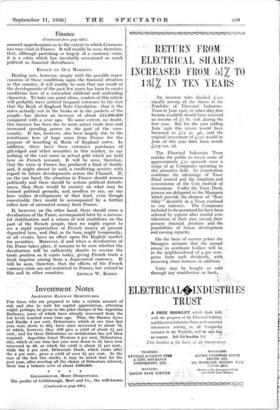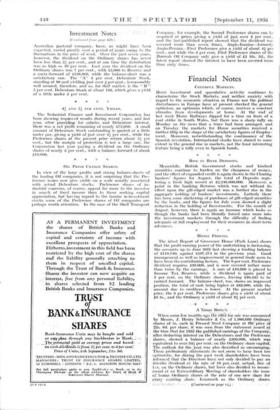Investment Notes
ARGtNTINE RAILWAY DEBENTURES.
FOR those who are prepared to take a certain amount of risk and also to wait for capital appreeiation, attention might, perhaps,- be-given to the prior charges of the Argentine Railways, some of ,whieh have already recovered from the low levels touched. some time ago. Thus, the Buenos Ayres and Pacific 4 per cent. Debentures, which at one time last year were down to 631, have since recovered to about 76,. at which, however, they still give a yield of about 5f per cent., and for these Debentures no moratorium has yet been required. Argentine Great-Western 4 per cent. Debentiires,' also, which at- one time last year were down to 52, have now recovered to 69, ' at which the yield is about .5f per cent., while the 5 per cent. Debenture Stock, which ranks after the 4 per cent., gives a yield of over 61 per cent. In the case of the last two stocks, it may be noted that for the past year, after meeting all the claims of Debenture interest, there was a balance over of about £500,000.
• * * * CrOLDSBROUGH, MORT DEBENTURES.
The profits of Goldsbrough, Mort and Co., the well-known (Continued on page 440.)
Investment Notes:
(Continued from page 439.) Australian pastoral' company, have, as might have been expected, varied greatly over a period: of years owing to the fluctuations in the price of wool. Over the past seven years, however, the dividend on the Ordinary shares has never been less than 24 per cent., and at one time the distribution was as high as 10 per cent. Last year the dividend on the Ordinary shares was 7 per cent., with £5,000 to Reserve and a carry-forward of £138,000, while the balance-sheet was a satisfactory one. The "A" 4 per cent. Debenture Stock, standing at 98 and yielding just over4,per cent., is reasonably well secured, therefore, and so, for that matter, is the " B " 5 per cent. Debenture-Stock.at-about 102, which gives a yield of a little under 5 per cent.
44 AND 54 PER CENT. YIELDS.
The Industrial Finance and Investment Corporation has been showing improved results during recent years, and last year, after prpviding for salaries and Debenture interest. there was a net omit 'remaining of nearly 175,000. A small amount of Debenture Stock outstanding is quoted at a little under par, giving a yield of just over 41 per cent., while the Preference shares at' the present price return about 5i per cent., but the -margin of protection is not a large one, the Corporation last year paying a dividend on the Ordinary shares of nearly 3 per cent., with a balance forward of about £10,000. .
* * a a OIL PRIOR CIIARGE SHARES.
In view of' the large profits and strong balance-sheets of the leading Oil companies, it is not surprising that the Pre- ference issues now give yields on a scale usually associated with actual Debenture stocks. Preference shares of in- dustrial concerns, of course, appeal far more to the investor in search of fixed income than to those seeking capital appreciation, bit having regard to the famine in investment stocks some of the Preference shares. of Oil companies are perhaps worth attention. In the case of the Shell Transport
Company, for example, the Second Preference shares can be acquired at prices ,giving a yield of just over 4 per cent., and the last-published repcirt showed that the dividend was covered more than seven times. Anglo-Iranian—formerly Anglo-Persian—First Preference give a yield Of about 44 per cent., and while the 6 per cent. First Preference shares of the Burmah Oil Company only give a yield of £3 16s. 3d., the latest report showed the interest to have been covered more than sixty times.













































 Previous page
Previous page